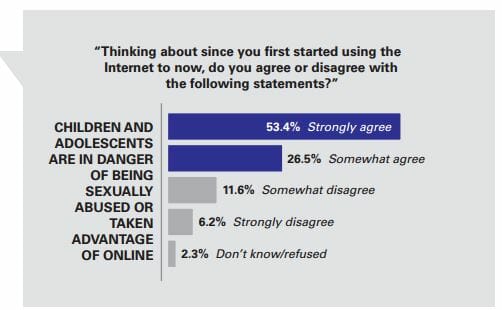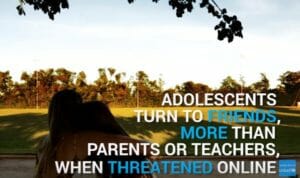As schools across the country get ready to open their doors, parents and educators prepare to address not only bullying but also today’s digital problem, cyberbullying.
Last year UNICEF released their report Perils and Possibilities: Growing up online, based on an international opinion poll of more than 10,000 18-year-olds from 25 countries, revealed young people’s perspectives on the risks they face growing up in an increasingly connected world.
One of the biggest issues facing youth today is online bullying and harassment. One survey found it to be more concerning than drug abuse.
Most teens know that when they encounter cyberbullies, they should stop, block and tell, (and I always advise them to screen-shot all the evidence before you block them), however the telling is most important.
When I went through my darkest times of being a victim of online shaming and abuse, you feel completely alone, fearful and humiliated. As an adult — I felt this way, so when I hear about youth being verbally tortured online, I know this has to be extremely painful. Without having someone to confide in, it can emotionally kill you.
- In Central European countries, 63% of interviewees strongly agree they would tell a friend if they felt threatened online, compared to 46% who would tell their parent. Only 9% would tell a teacher.
More than half, (53%) of the 10,000 that were polled around the world strongly agreed that online dangers exist.

With more than half believing there are online risks and dangers, 90% believe they know how to avoid these problems.
“Despite recognition that dangers
exist online, nearly nine out of 10
adolescents think they have learned
how to protect themselves on
social media and know how to avoid
dangerous situations while using the
Internet.”
Whenever you are being harassed or bullied online, especially if virtual violence or otherwise is involved, being able to tell someone is imperative. With younger people we encourage them to tell their parents, however we know at times this can be difficult. They fear their will lose their online privileges or not be taken seriously. Sometimes they fear they will be consider a tattle-tale.
In this report the majority of adolescents polled said the would turn to a friend, and that’s okay. As long as you tell someone.
- 54% said they would tell a friend.
- 48% said they would tell a parent.
- 19% said they would tell a teacher.

Today sexting is considered the new flirting. So if your teen shares flirty pictures with their boyfriend or girlfriend keep in mind, those images will typically have a life span longer than the relationship. Most important is discussing the consequences of sexting: Sending or receiving a sexually suggestive text or image under the age of 18 is considered child pornography and can result in criminal charges.
Don’t assume your sexy images will be kept private even if your friend makes a promise they will be — once there’s a break-up, all bets are off.
It’s why we see the rise in revenge porn and sextortion.
- 67% of girls agreed they would be worried if someone made sexual comments to them online.
- 47% of boys said they had the same concern (a significant difference).
We often read so much about women being targets online when it comes to digital shaming, harassment, revenge porn and more, which is understandable with these statistics. Men can be victims too – but we do hear an overwhelming amount of stories that revolve around the female gender.
Parenting tips:
- Communication is key.
- Offline chats are imperative to online safety.
- Go online with your child, be as interested in their cyber-life as you are in their school life.
- Remember, short chats are better than no chats at all.
- It’s not the apps – it’s having the skills and wisdom to know when to click-out when they are uncomfortable.
- Continue to remind your kids you are there for them – but it’s also okay for them to talk to any trusted adult. If someone is being harassed online, they have to tell someone. Don’t be hurt – but grateful they are sharing it with someone.
“When young people, governments, families, the ICT sector and communities work together, we are more likely to find the best ways to respond to online sexual abuse and exploitation, and send a strong message that confronting and ending violence against children online – indeed anywhere – is all of our business,” said Williams.
About UNICEF
UNICEF promotes the rights and wellbeing of every child, in everything we do. Together with our partners, we work in 190 countries and territories to translate that commitment into practical action, focusing special effort on reaching the most vulnerable and excluded children, to the benefit of all children, everywhere.
The full study is here: http://www.unicef.org/endviolence/endviolenceonline/files/UNICEF_Growing-up-online.pdf
